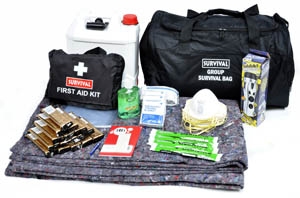
- Torch with spare batteries or a self-charging torch
- Radio with spare batteries
- Wind and waterproof clothing, sun hats, and strong outdoor shoes.
- First aid kit and essential medicines
- Blankets or sleeping bags
- Pet supplies
- Toilet paper and large rubbish bags for your emergency toilet
- Face and dust masks
Check all batteries every three months. Battery powered lighting is the safest and easiest. Do not use candles as they can tip over in earthquake aftershocks or in a gust of wind. Do not use kerosene lamps, which require a great deal of ventilation and are not designed for indoor use.
Food and water for at least three days
- Non-perishable food (canned or dried food)
- Food, formula and drinks for babies and small children
- Water for drinking. At least 3 litres per person, per day
- Water for washing and cooking
- A primus or gas barbeque to cook on
- A can opener
Check and replace food and water every twelve months. Consider stocking a two-week supply of food and water for prolonged emergencies such as a pandemic.
